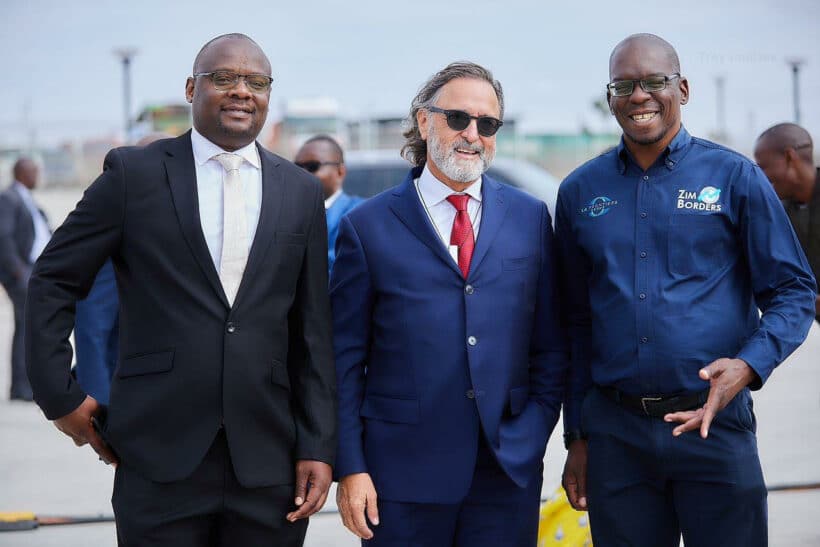
As a former transporter who owned and managed what became one of the largest Johannesburg Stock Exchange listed leading transport companies in Southern Africa, running 10,000 trucks, I learned firsthand about the crippling impact of poor infrastructure on the transport industry and broader economies. Our cross-border’s operation’s largest costs were the cost of being delayed at borders which has motivated us to look at solutions. In my view, transport and logistics are the backbone supporting trade, goods movement and economic growth. This drove my decision to partner with African governments to build and rehabilitate key transport infrastructure projects.
My team at Safaga International Management, its affiliates and partners originated a vision by pioneering the new, modernised Beitbridge border post. I was the founder, sponsor and still serve as the chairman of ZimBorders. I am also the Chairman of La Frontiere Group (LFG), Safaga, Chirundu and Forbes Border Consortiums, and other border infrastructure development companies whose vision is to have an end-to-end solution to advance the North South Corridor principle.
This flagship project will undoubtedly be successful – improving efficiency, reducing congestion and transit fraud and we project it will generate a 300% increase in government tax revenues by lowering transporter costs and turnaround times, and facilitate safer and faster border crossings for travelers. Already, it now takes a few hours for trucks to cross the border compared with up to a week before.
Overall, Beitbridge represents a milestone for regional trade and cooperation as well as being a flagship project for Zimbabwe and the sub-region as an example of what is possible in spite of severe challenges.
The Beitbridge project showcases what investment in border infrastructure development can achieve, including housing and social infrastructure which uplifted the whole community. With the injection of some $300m investment for the Beitbridge Border Post Upgrade and Modernisation Project, the border town’s economy has grown significantly, creating new jobs and raising living standards. We think similar pacts on other border towns are likely with sufficient and well managed investments.
In my view, Africa is ripe for investment and public-private partnerships, leveraging support from institutions like the African Export-Import Bank, Africa50, the African Development Bank and local and international commercial banks.
Experienced private sector players like Safaga have track records of working with multilateral agencies, African governments and technical experts to build worldclass borders supporting the continent’s growth. Investing in borders will facilitate intra-African trade, moving the goals of the African Continental Free Trade Area and single market closer. Upgraded border posts will drive cross-border commerce, opening markets, encouraging competition and diversity, enabling cultural exchanges and boosting sectors like tourism, agriculture and mining.
The African Union’s 2020 Integrated Border Governance Strategy recognises borders can promote stability, peace, security and integration. Border regions can become catalysts for socioeconomic advancement if effective cooperation and development is prioritised. This is even more important given the role Africa and its resources are expected to play in the fight against climate change, where key new-age minerals such as lithium, graphite, and rare earths are essential components of green technologies such as batteries, electric vehicle motors and wind turbines.
Resources such as copper and cobalt are also essential for these pursuits and for the expansion of cities and towns around the world. With Africa abundantly blessed with these resources, we expect there will be a boom in demand for these resources, which will put increased strain on transport routes and border posts in coming years.
As a native of Africa born in Zimbabwe, Africa has given me the privilege of being in a position to make a positive lasting impact. Our border infrastructure work aims to pay that back. I reflect often on my early days as a young businessman entering into the transport sector with little or no knowledge yet through perseverance and seizing chances, I have contributed in a small way towards enabling trade, transport and construction across Africa.
My teams and I are focused on infrastructure partnerships with governments and other stakeholders. Roads, bridges and border posts might not seem commercially alluring ventures, but without connectivity allowing goods and people to transport, no economy can trade or socially integrate. Having been a transporter dependent on roads and crossings myself, I knew investing in infrastructure could transform African promise into reality. I believe that our Beitbridge Border Post is just that.
Beitbridge was our pilot project, demonstrating private sector participation with public agencies that could reimagine borders. Once an impeded outpost with endless queues, new technologies and modern customs facilities have meant trade flows improved exponentially even before construction was finished. The two governments have seen improved revenues while transporters and travellers have gained from improved services. That is the essence of what Public Private Partnership means.
My journey to pioneering border infrastructure developer taught me that Africa’s greatest asset is its human capital. Given the roads and bridges to transport goods, opportunities and ideas, Africans will thrive. Our shared destiny as neighbours means helping each other rise. If borders and transport infrastructure can enable African talent to fulfill its dreams, then my vision and work’s core purpose is fulfilled.

